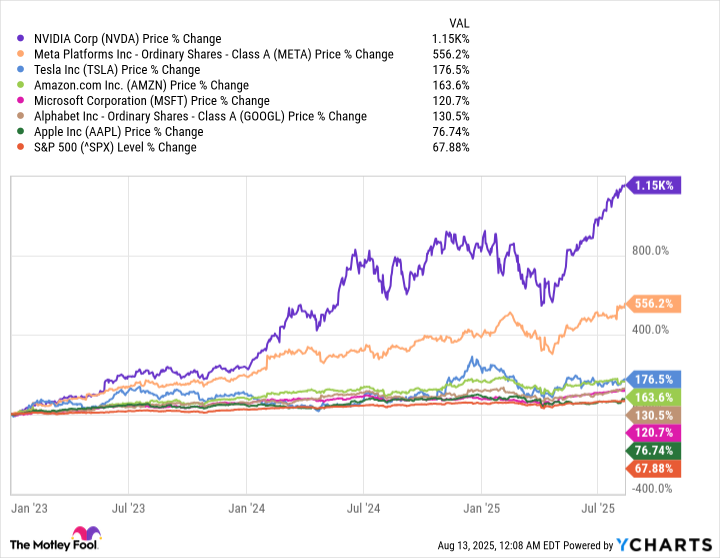The term "Magnificent Seven" was first used by Wall Street analysts in 2023 to describe a group of seven companies that operate at the cutting edge of the technology industry. They are worth a combined $19.7 trillion, but their incredible size isn't the only reason they earned the nickname.
Since the artificial intelligence (AI) revolution started gathering momentum at the start of 2023, the Magnificent Seven stocks have delivered a median return of 163%, which is more than twice the 67% gain in the benchmark S&P 500 index over the same period.
In other words, investors who don't own the Magnificent Seven stocks are likely underperforming the broader market. Fortunately, there is a simple way to buy them all right now, with a splash of diversification from some of America's other stock market giants.
The Vanguard Mega Cap Growth ETF (MGK -0.38%) is an exchange-traded fund (ETF) that invests exclusively in America's largest companies. It holds a portfolio of just 69 stocks, but it's highly concentrated with the Magnificent Seven representing 57.7% of its entire value.

Image source: Getty Images.
The Magnificent Seven are leading the AI race
The companies in the Magnificent Seven operate very different businesses, but they have one thing in common: They are betting big on AI right now:
- Nvidia (NVDA -0.85%) supplies the most advanced graphics processing units (GPUs) for the data center, which are the primary chips used in AI development.
- Microsoft (MSFT -0.40%) created an AI assistant called Copilot, which is embedded in flagship products like Windows and 365. The company also operates a cloud platform called Azure that has become a top destination for AI developers seeking the computing power and ready-made large language models (LLMs) they need to build AI software.
- Apple (AAPL -0.55%) launched its Apple Intelligence software last year, which adds new AI-powered features to the latest iPhones, iPads, and Mac computers. Apple Intelligence can summarize messages and emails, generate text and image content, and even prioritize notifications based on what each user deems important.
- Amazon (AMZN -0.00%) has developed over 1,000 AI software applications across its entire organization. They include the Rufus shopping assistant on Amazon.com, and Project Private Investigator which screens products for defects in its fulfillment centers. The Amazon Web Services cloud platform is also a leading provider of AI data center capacity, LLMs, and AI software.
- Alphabet (GOOG 0.52%) (GOOGL 0.46%) developed a family of LLMs called Gemini. They are transforming its Google Search platform with new AI features, and over 85,000 organizations also use them to develop their own AI software via Google Cloud.
- Meta Platforms (META 0.38%) uses AI to autonomously recommend content and advertisements to users on its Facebook and Instagram social networks, and the company also developed the world's most popular family of open-source LLMs called Llama.
- Tesla (TSLA -1.64%) has become one of the world's leading developers of autonomous driving technologies. The company is gearing up to mass-produce its new Cybercab robotaxi in 2026, which could transform the ride-hailing industry.
Although the Magnificent Seven stocks represent 57.7% of the Vanguard ETF's portfolio by value, the other 42.3% includes several non-technology heavyweights like Eli Lilly, Visa, Mastercard, Costco, McDonald's, Boeing, and more. In other words, the ETF does offer some diversification.
This ETF can supercharge a diversified portfolio
The Vanguard Mega Cap Growth ETF shouldn't be treated as a complete portfolio on its own, because its high degree of exposure to themes like AI can create significant risks. The Magnificent Seven stocks would likely underperform the broader market for a period of time if AI fails to live up to expectations, which would weigh on the ETF.
But the ETF could supercharge a diversified portfolio of other funds and individual stocks. It has delivered a compound annual return of 13.5% since it was established in 2007, comfortably beating the average annual gain of 10.1% in the S&P 500 over the same period.
Had you invested $20,000 in the S&P 500 in 2007, it would be worth $113,032 today. But had you invested $10,000 in the S&P and the other $10,000 in the Vanguard ETF, your $20,000 would have grown to $154,222 instead. This strategy also would have smoothed out some of the volatility the Vanguard ETF experienced along the way as a result of its concentrated holdings.
Cathie Wood's Ark Investment Management predicts that AI will create a $13 trillion opportunity in the software industry by 2030, and on the hardware side, Nvidia CEO Jensen Huang says annual data center spending could top $1 trillion by 2028. Those forecasts suggest the AI revolution is still in the very early stages, so investors who don't have exposure to the Magnificent Seven stocks might want to consider buying this Vanguard ETF today.






